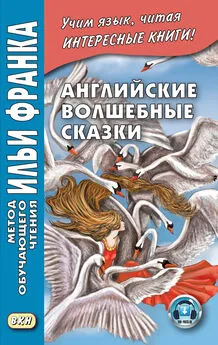Елена Лебедева - Лучшие английские сказки / Best english fairy tales
- Название:Лучшие английские сказки / Best english fairy tales
- Автор:
- Жанр:
- Издательство:Литагент АСТ
- Год:2016
- Город:Москва
- ISBN:978-5-17-095437-7
- Рейтинг:
- Избранное:Добавить в избранное
-
Отзывы:
-
Ваша оценка:
Елена Лебедева - Лучшие английские сказки / Best english fairy tales краткое содержание
Все тексты адаптированы для удобства читателя и снабжены комментариями. В конце книги вы найдете общий словарь, который поможет понимаю текста.
Предназначается для всех, кто изучает английский язык (уровень 2 – для продолжающих нижней ступени).
Лучшие английские сказки / Best english fairy tales - читать онлайн бесплатно ознакомительный отрывок
Интервал:
Закладка:
Goldilocks jumped off the bed and ran downstairs, out of the door and down the garden path. She ran and she ran until she reached the house of her grandmama. When she told her grandmama about the house of the three bears who lived in the wood, her granny said: ‘My my, what a wild imagination you have, child!’
But Goldilocks knew that the story was true, and as for the three bears, whenever they went out of their wee house in the woods, they always locked the door in case Goldilocks came back and stole their porridge again. But they need not have worried about Goldilocks because, for as long as she lived she never took anything that didn’t belong to her – unless of course she had the permission of the owner.
The Sly Fox and the Little Red Hen
Once there was a little red hen. She lived in a little red henhouse, safe and sound, with a little blue door and windows all around. She was a happy hen. Every day she searched for grain with a peck, peck, peck and a cluck, cluck, cluck. But then a sly young fox and his mother moved into a nearby den. The sly fox was always hungry. He licked his lips when he grain with a peck, peck, peck and a cluck, cluck, cluck. And then the sly fox tried to catch the little red hen. He plotted and planned, again and again. But the little red hen was clever. She always got away, with a peck, peck, peck and a cluck, cluck, cluck. But then the sly fox thought up a very sly plan. ‘Mother, boil some water in a pan,’ he said. ‘I’ll bring home supper tonight.’ Then he crept over to the little red henhouse. And he waited until at last the little red hen came out to search for grain with a peck, peck, peck and a cluck, cluck, cluck. Quick as a flash, the sly fox slipped into the henhouse. And he waited until the little red hen came hurrying home. As soon as she saw the fox, she flew up to the rafters. ‘You can’t catch me now!’ she laughed, with a peck, peck, peck and a cluck, cluck, cluck. ‘All part of my plan,’ smiled the fox on the ground. And slowly he started to chase his tail, round and round and round and round, faster and faster… until the little red hen up in the rafters grew dizzy. ‘Oh!’ she clucked. ‘My poor head’s spinning. I’m all in a tizzy.’ And she dropped down – plop! – straight into the fox’s sack. ‘Ha!’ laughed the fox. And then the fox slung the sack over his shoulder and set off for home with the little red hen. After a while, he stopped for a rest. The sun was warm and soon he was snoozing. ‘Now’s my chance,’ whispered the little red hen, and out she crept without a peck, peck, peck or a cluck, cluck, cluck. Quickly she rolled some large stones into the sack and tied a knot at the top. Then she ran all the way home and didn’t stop till she was safe in her little red henhouse. The fox woke up and went on his way, hungry for his supper. ‘This hen is heavy!’ he said to himself, licking his lips. ‘She’ll make a good meal.’ ‘Is the pot boiling, Mother?’ he called at the den. ‘Look who I’ve got! It’s the little red hen.’ ‘Throw her in, son,’ said his mother. ‘She’ll make a nice snack.’ So the sly fox opened up the sack. Into the boiling water crashed the stones with a SPLASH! And that was the end of the sly fox and his mother. And the little red hen lived happily ever after in her little red henhouse, searching for grain with a peck, peck, peck and a cluck, cluck, cluck.
A Stolen Horse
It was in South America. A rich Spaniard was riding home when suddenly the horse fell lame. [5] fell lame – захромал
As it happened far from his home, he did not know what to do, for he saw that his horse would not be able [6] to be able – иметь возможность, мочь
to bring him home. A little later he met an Indian riding a fine horse and asked him to exchange the horses. The Indian refused to do this. But the Spaniard, being much stronger than the Indian, made him give up [7] to give up – сдавать(ся), оставлять
his horse. And the Spaniard rode away, leaving his lame horse to the Indian who was soon left far behind. But the Indian followed him and came to the town where he found the Spaniard. He went to a judge and said that the Spaniard had stolen his horse.
Then the Spaniard was asked to swear that the horse was his own and he had had it for many years. Then the Indian asked to send for the horse. This was done. And the Indian said: ‘This man swears that he has had this horse for many years; let him, therefore tell you in which of the eyes the horse is blind.’
The Spaniard said at once: ‘In the right eye.’
‘You are wrong’, said the Indian. ‘Neither in the right nor in the left, it is not blind at all.’
And so the horse was returned to the Indian.
Dirty Boots
Once Swift went on a journey, accompanied by his servant. They were both on horseback. [8] to be on horseback – верхом на лошади
The journey was long, so when night came, they had to stop at an inn.
In the morning Swift asked for his boots. The servant brought them, but the writer saw that they were as dirty as the night before. ‘Why haven’t you cleaned my boots?’ he asked his lazy servant.
‘Well, sir, as you are going to ride today, I thought that if I cleaned them, they would soon be dirty again’.
‘All right, get the horses ready, [9] to get ready – готовить(ся)
’ Swift said, and went to have his breakfast. Then he paid his bill and left the inn. His servant was already in front of the inn with the horses.
‘Well, let’s go on.’
‘But, sir, I’m hungry, I haven’t had my breakfast yet.’
‘Never mind, if you had, you would soon be hungry again’, the author replied and rode away. The lazy servant had to follow his master, but he never forgot the lesson he had been taught.
A Traveller’s Tale
In the autumn of 1935, when I was a young man, I was traveling in the north-west of India. One evening, after hunting in the forest all day, I was returning alone to the place where I had put up my tent. It was getting dark, [10] to get dark – темнеть
and I was walking along a narrow path. On my right was a wide river; on my left, a thick, dark forest. Suddenly I saw two green eyes looking at me from among the trees. A man-eating tiger [11] a man-eating tiger – тигр-людоед
was getting ready to jump on me.
What could I do? Should I jump into the river and hope to save my life by swimming? I looked to the right. In the river there was an immense crocodile waiting to welcome me with its mouth wide open.
I was so frightened that I shut my eyes. I heard branches moving as the tiger jumped. I opened my eyes. What do you think had happened? The tiger had jumped right over me and was now in the jaws of the crocodile. That’s a true story, believe it or not!
The Letter-Box Key
Once an Englishman went to the seashore for his summer holidays. He asked his housekeeper to post him all letters that she would receive during his absence. She promised him to do that.
The Englishman rested very well. A month passed but he received no letters. He thought it strange and he rang up his housekeeper:
‘Why didn’t you post my letters?’
‘Because you didn’t leave me the key of the letter-box,’ was the reply.
The Englishman apologized and promised to send her the key. In some days he put the key into an envelope, wrote down his address on it and posted the letter.
Another month was passing but still he did not receive the letters.
When at the end of the month he returned home, he spoke angrily with his housekeeper.
‘But what could I do?’ asked the poor woman. ‘The key which you posted was in the locked letter-box too.’
The Emperor’s New Clothes
Many years ago there was an Emperor so fond of [12] to be fond of – сильно интересоваться, быть в восторге от
new clothes that he spent all his money on new dresses. He did not care about his soldiers, going to the theatre, or going for a ride in his carriage, he only liked to show off his new clothes. He had a coat for every hour of the day.
In the great city where he lived, life was always gay. Every day many strangers came to town, and among them one day came two swindlers. They let it be known they were weavers, and they said they could weave the most magnificent fabrics imaginable. Not only were their colors and patterns uncommonly fine, but clothes made of this cloth had a wonderful way of becoming invisible to anyone who was unfit for his office, or who was unusually stupid.
‘Those would be just the clothes for me,’ thought the Emperor. ‘If I wore them I would be able to discover which men in my empire are unfit for their posts. And I could tell the wise men from the fools. Yes, I certainly must get some of the stuff woven for me right away.’ He paid the two swindlers a large sum of money to start work at once.
They set up two looms and pretended to weave, though there was nothing on the looms. All the finest silk and the purest old thread which they demanded went into their traveling bags, while they worked the empty looms far into the night.
‘I’d like to know how those weavers are getting on with the cloth,’ the Emperor thought, but he felt slightly uncomfortable when he remembered that those who were unfit for their position would not be able to see the fabric. It couldn’t have been that he doubted himself, yet he thought he’d rather send someone else to see how things were going. The whole town knew about the cloth’s peculiar power, and all were impatient to find out how stupid their neighbors were.
‘I’ll send my honest old minister to the weavers,’ the Emperor decided. ‘He’ll be the best one to tell me how the material looks, for he’s a sensible man and no one does his duty better.’
So the honest old minister went to the room where the two swindlers sat working away at their empty looms.
‘Heaven help me,’ he thought as his eyes flew wide open, ‘I can’t see anything at all’. But he did not say so.
Both the swindlers begged him to be so kind as to come near to approve the excellent pattern, the beautiful colors. They pointed to the empty looms, and the poor old minister stared as hard as he dared. He couldn’t see anything, because there was nothing to see. ‘Heaven have mercy,’ he thought. ‘Can it be that I’m a fool? I’d have never guessed it, and not a soul must know. Am I unfit to be the minister? It would never do to let on that I can’t see the cloth.’
‘Don’t hesitate to tell us what you think of it,’ said one of the weavers.
‘Oh, it’s beautiful – it’s enchanting.’ The old minister peered through his spectacles. ‘Such a pattern, what colors!’ I’ll be sure to tell the Emperor how delighted [13] to be delighted – быть в восторге
I am with it.’
‘We’re pleased to hear that,’ the swindlers said. They proceeded to name all the colors and to explain the intricate pattern. The old minister paid the closest attention, so that he could tell it all to the Emperor. And so he did.
The swindlers at once asked for more money, more silk and gold thread, to get on with the weaving. But it all went into their pockets. Not a thread went into the looms, though they worked at their weaving as hard as ever.
The Emperor presently sent another trustworthy official to see how the work progressed and how soon it would be ready. The same thing happened to him that had happened to the minister. He looked and he looked, but as there was nothing to see in the looms he couldn’t see anything.
Читать дальшеИнтервал:
Закладка:










